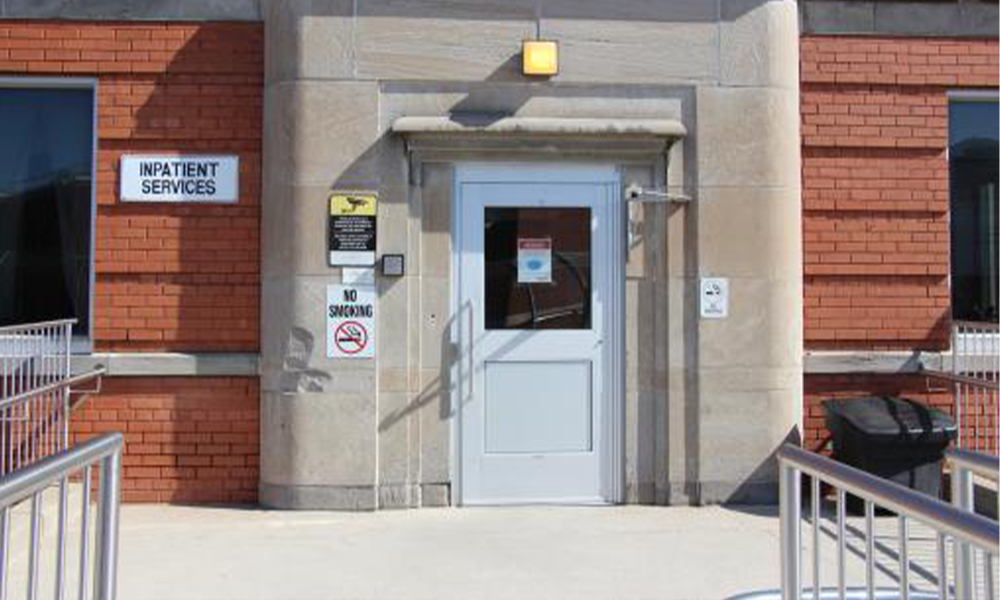About the Integrated Forensic Program
The Integrated Forensic Program provides specialized mental health treatment for individuals with serious mental illness who have come into contact with the criminal justice system or are at risk of doing so. Services focus on assessment, treatment, and risk reduction to support recovery and protect public safety. Treatment is delivered through inpatient and secure units in Ottawa and Brockville, with additional services supporting youth, families and community reintegration.
Core services
The Integrated Forensic Program provides a range of court-ordered assessments under Section 672.11 of the Criminal Code, including assessments of fitness to stand trial and criminal responsibility. The program also conducts pre-sentence reports and assessments for individuals designated as dangerous or long-term offenders.
Depending on custody status and clinical need, assessments are completed through The Royal’s inpatient or outpatient forensic units. Clients in custody may undergo assessment at the secure Forensic Treatment Units at The Royal’s Brockville or Ottawa campus.
The program also provides treatment under Section 672.58 of the Criminal Code to restore individuals to fitness to stand trial.
The Integrated Forensic Program provides secure inpatient and outpatient care for individuals under the jurisdiction of the Ontario Review Board (ORB), including those found Not Criminally Responsible or Unfit to Stand Trial. Services are offered through the Forensic Treatment Units at our Ottawa and Brockville campuses.
Care, risk and symptom management and overall recovery are informed through the lenses of the Risk-Need-Responsivity model of care. Through psychiatric rehabilitation, reduction of functional deficits, and reduction of risk of recidivism, the IFP’s ultimate goal is to treat justice involved persons suffering from severe mental illnesses to help improve their quality of life and reduce their risk of reoffending, which helps keeping our communities safe.
Each individual works with an interdisciplinary team to develop an personal treatment and reintegration plan within the conditions of their ORB disposition. Plans may include a tailored range of services and group programming.
Health and risk factors are continuously monitored by clinical and administrative teams to support recovery while maintaining public safety. Outpatient services are available following discharge to ensure continuity of care across the Champlain and South East regions.
Clients requiring more intensive support may be referred to specialty services such as the Forensic Intensive Treatment Team (FITT) in Brockville, which provides interprofessional care and intensive case management. Transitional rehabilitative housing is also available in partnership with community providers to support long-term reintegration.
The Integrated Forensic Program provides specialized mental health care to adult men with serious mental illness who are serving provincial sentences (less than two years) at the Secure Treatment Unit of the St. Lawrence Valley Correctional and Treatment Centre. This 100-bed facility, located at The Royal’s Brockville campus, is a hybrid correctional and mental health hospital serving individuals from 25 provincial institutions across Ontario.
The Secure Treatment Unit is operated through a partnership between The Royal and the Ministry of the Solicitor General. Clinical care—including assessment, treatment and daily supervision—is the responsibility of staff from The Royal’s Integrated Forensic Program. Security and facility operations are managed by Ministry staff. The unit is designated a Schedule 1 mental health hospital by the Ministry of Health, and follows a hospital-based model of care supported by a multidisciplinary team.
Treatment is based on evidence-informed models, including the Risk-Needs-Responsivity (RNR) model, and includes assessment, stabilization and rehabilitation services. Units include:
- Assessment and Stabilization Unit
- Sexual Behaviours Unit
- Trauma Disorders Unit
- Aggressive Behaviour Modulation Unit
Each unit offers individualized programming focused on both recovery and criminogenic risk reduction to support reintegration and reduce the risk of reoffending.
The Integrated Forensic Program also provides psychiatric consultation via telemedicine (Ontario Telemedicine Network) to other provincial correctional facilities across Ontario.
Specialty services
The Royal’s Sexual Behaviours Clinic serves individuals who have been or are at risk of being in conflict with the law because of their sexual behaviour. For more information, visit the Sexual Behaviours Clinic page.
The Forensic General Consultation Clinic provides psychiatric consultation for adults involved in the justice system who are on bail or probation. Services include diagnostic clarification, treatment recommendations and violence risk assessments.
Access to this service requires a referral from a physician. Individuals without a family doctor may request a referral from a walk-in clinic physician.
The Forensic Dual Diagnosis Consultation Clinic provides consultation and support to individuals with a developmental disability who appear to be on a forensic trajectory in efforts to divert the individual from entering the forensic system. The team consists of a Registered Nurse, a Behavioural Therapist and a consulting Psychiatrist.
The Family Court Clinic provides court-ordered psychiatric and psychological assessments for children, youth and families under the Youth Criminal Justice Act (YCJA). The goal is to assist the court in understanding the mental health, behavioural and psychosocial factors affecting the child or youth and to offer evidence-based recommendations that support the best interests of the individual.
Assessments are conducted by a multidisciplinary team. Reports may include recommendations for treatment, interventions and services tailored to the specific clinical needs of the child or youth. Final reports are authored by the psychiatrist, with contributions from the broader assessment team.
For youths aged 12 to 18, the clinic also completes court-ordered assessments under Section 141 of the YCJA, including assessments of fitness to stand trial and criminal responsibility (under Part XX.1 of the Criminal Code), as well as Section 34 assessments to support disposition planning. These evaluations consider the role of mental illness, behavioural concerns, family dynamics and other psychosocial factors in a youth’s involvement with the justice system.
Each assessment includes psychiatric and psychological evaluations, interviews with parents or guardians and review of collateral information from previous care providers, when consent is obtained. Recommendations are provided to inform treatment planning, support rehabilitation and reduce the risk of reoffending.
Final reports are submitted to the court and are subject to legal confidentiality and disclosure requirements.
The Integrated Forensic Program provides specialized assessment and treatment services for youth under the age of 18 at the time of their charge. Services include court-ordered assessments of criminal responsibility and fitness to stand trial under Part XX.1 of the Criminal Code, as well as treatment and stabilization orders.
These services are available to Youth Courts across the Champlain region and are delivered by a multidisciplinary team. Treatment is provided in the least restrictive setting possible, based on clinical need and risk, and is structured to support timely court processes while minimizing disruption to a youth’s daily life.
The Integrated Forensic Program provides court-based assessment services at the request of Crown attorneys or defence counsel. When an individual is in custody, a forensic psychiatrist may complete an assessment by video or in person at the courthouse to determine whether a formal court-ordered assessment of fitness to stand trial or criminal responsibility is warranted.
The team also provides recommendations regarding eligibility for Mental Health Court and may advise on the need for further assessment or treatment. Individuals who are not in custody may be referred to the Mental Health Court Clinic for consultation.
These services are delivered in collaboration with community partners, including the Canadian Mental Health Association and the John Howard Society.
The Integrated Forensic Program offers intensive outpatient services for individuals under the jurisdiction of the Ontario Review Board (ORB), including those found Not Criminally Responsible or Unfit to Stand Trial.
The outpatient team provides enhanced outpatient care, structured day treatment and coordinated community supports to help individuals reintegrate safely and successfully. Using a recovery-oriented approach, each individual works with their team to develop and implement a rehabilitation plan that aligns with the conditions of their ORB disposition.
Support may continue for up to one year, on a voluntary basis, following an absolute discharge or stay of proceedings.
The Royal’s Integrated Forensic Program offers peer support for individuals receiving forensic mental health treatment, as well as their families and caregivers. These services recognize the distinct challenges at the intersection of mental illness and the justice system and provide both one-on-one and group-based support to help reduce stigma, strengthen coping skills and promote recovery.
To access individual peer support (in person, by Zoom or by phone), contact:
- Christine – (613) 805-5013 (Ottawa)
- Ann-Marie – (613) 805-5160 (Brockville)
Transitional Housing
Transitional housing services are for Ontario Review Board-Ordered Detention and Rehabilitation.
The FITT Home in Brockville provides 24-hour supervised housing for individuals in the forensic mental health system who are transitioning from inpatient care to independent living.
This transitional residence offers structured support to help build daily living skills, stabilize in the community, and meet the conditions of their Ontario Review Board disposition.
The FITT-DD Program at The Royal’s Brockville campus is a collaborative transitional housing initiative between the Integrated Forensic Program and Developmental Services of Leeds and Grenville (DSLG). It supports individuals with developmental disabilities and/or dual diagnosis as they transition from forensic inpatient care into the community.
The program provides structured psychosocial assessment and rehabilitation in coordination with community agencies. Services focus on recovery, risk management and skill development to support safe reintegration into generic community services and appropriate housing, in accordance with Ontario Review Board (ORB) disposition orders.
Each individual receives an individualized Community Placement Support Plan outlining behavioural and developmental needs, risk considerations, monitoring requirements and tailored programming.
Eligibility criteria
Participants must:
- Have a developmental disability
- Be an inpatient within the Integrated Forensic Program at The Royal’s Brockville campus
- Require specialized support not available through other residential programs
- Meet eligibility as confirmed by Developmental Services Ontario (DSO)
- Hold an ORB disposition order permitting “living out” in the community at the discretion of the hospital
- Have reasonable potential to transition to generic supportive housing and community services within an average 18-month timeframe
The Lebreton Transitional Rehabilitation Program provides short- to medium-term housing and structured supports for individuals under the jurisdiction of the Ontario Review Board. The program is designed to assist with the transition from inpatient rehabilitation to independent community living.
Residents typically stay for up to one year and receive support for needs that can be monitored and managed in a community setting. Services include medication monitoring, substance use support and access to vocational opportunities. Functional skills related to daily living are addressed in collaboration with the outpatient team, Canadian Mental Health Association caseworkers and programming delivered by The Royal and the John Howard Society.
The program supports long-term housing stability by promoting recovery, building independence and coordinating care across service providers.
The Grove Transitional Rehabilitation Program provides structured housing and psychosocial rehabilitation for adults living with persistent mental illness. The program supports up to 10 individuals—four in residence at Grove and six in nearby satellite apartments—who are working toward greater independence in the community.
Grove offers 24-hour supervised housing, medication support and access to therapeutic programming. The focus is on building daily living skills, supporting recovery and helping individuals prepare for a successful transition to community living. Length of stay is typically up to one year, based on individual treatment and rehabilitation goals.
This program is delivered in partnership with Salus, the Canadian Mental Health Association and The Royal.
Referrals
The Integrated Forensic Program accepts referrals from Crown attorneys, the courts and the Ontario Review Board.
Referrals for the following programs should be directed through The Royal’s Central Intake:
- Sexual Behaviours Cinic
- General Forensic Consultation Clinic
Referrals to the Secure Treatment Unit are initiated by the Ministry of the Solicitor General. Only a Correctional Services Classification Officer at the individual’s home institution can submit an application. While recommendations from courts or community agencies are considered, they do not initiate the referral process.

About the Forensic Mental Health System
The Ontario Review Board (ORB) conducts annual reviews of the status of every person who has been found to be not criminally responsible or who is unfit to stand trial for criminal offences due to a mental disorder. Information on the ORB can be found on its website at orb.on.ca.
Support for families
Planning a Visit
Support from family and loved ones plays a crucial role in recovery. Visitors are welcome at The Royal’s Forensic Treatment Units at the Ottawa and Brockville campuses, as well as the Secure Treatment Unit.
For safety, security and space management, all visitors to the Forensic Treatment Units must contact the unit at least 24 hours in advance to schedule their visit. Visiting hours vary by unit. Please speak with unit staff to confirm details.
Visits to the Secure Treatment Unit are arranged and approved by the Ministry of the Solicitor General. Visits may take place in an open visiting room or in a closed setting with a telephone connection.
To request or confirm a visit at the Forensic Treatment Units or the Secure Treatment Unit, contact:
Forensic Treatment Unit, Ottawa campus: (613) 722-6521
Forensic Treatment Unit, Brockville campus: (613) 345-1461
Secure Treatment Unit, Brockville: (613) 341-2870
Ministry of the Solicitor General: (613) 341-2870 ext. 1100

Family Peer Support
The Royal’s Integrated Forensic Program offers peer support for families and caregivers of individuals receiving forensic mental health treatment. These services provide both one-on-one and group-based support to help reduce stigma, strengthen coping skills and promote recovery.
A virtual family peer support group is offered Monday evenings from 7 to 9 p.m. For more information or to register, email familypeersupport1-forensic@theroyal.ca.
To access individual peer support (in person, by Zoom or by phone), contact:
Christine – (613) 805-5013 (Ottawa)
Julie – (613) 805-5160 (Brockville)

Family & Caregiver Guide
If you’re a family member or caregiver, know that you’re not on this journey alone. The Royal is here to support both you and your loved one.
